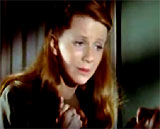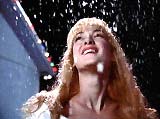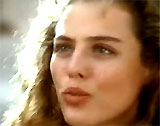|
The Greatest Tearjerkers of All-Time
|
|
Title Screen
|
Movie Title/Year and Brief Tearjerker Scene Description |
Screenshots
|

|
 E.T.: the Extra-Terrestrial (1982)
E.T.: the Extra-Terrestrial (1982)
 #8
#8
 #1
#1
- the overwrought death scene of the
stranded, odd-looking alien E.T. (voice of Pat Welsh), witnessed by
a heart-broken 10-year old Elliott (Henry Thomas) next to him - Elliott's
house had been quarantined and scientists had enveloped or enclosed
it in an air-tight, cocoon-like plastic tent to either protect or
decontaminate it. Both Elliott and E.T. were stretched out on long
tables alongside each other within another quarantined and plastic-enclosed
room. The two were connected to life-support equipment that registered
similar graphing results. Elliott protested: ("You have no right
to do this. You're scaring him. You're scaring him! Leave him alone.
Leave him alone, I can take care of him"). As E.T. began to approach
death, his blood pressure sank, while Elliott's condition stabilized.
Elliott held out his hand to E.T., tearfully asking him to stay
connected: ("E.T.
Stay with me. Please...Together. I'll be right here. I'll be right
here"). E.T.'s
life faded away. Elliott lost his telepathic connection to E.T.
as he miraculously came back to full life: ("The boy's coming back.
We're losing E.T."). The boy stretched his arms out to his dead
friend, pleading for him to answer. A distraught Elliott screamed
to E.T. as doctors and scientists rushed en masse to E.T.'s bedside
and tore open the plastic coverings around him. Realizing that E.T.
had no blood pressure, pulse or respiration, they made frantic efforts
to revive the alien, administer CPR and other life supports - as
Elliott reached out: ("E.T. Don't go!...Leave him alone. You're
killing him. Leave him alone")
- tearful and sorrowful, Elliott
kept a vigil next to E.T. and spoke lovingly to his dead, extra-terrestrial
friend: ("Look
at what they've done to you. I'm so sorry. You must be dead, 'cause
I don't know how to feel. I can't feel anything anymore. You've gone
someplace else now. I'll believe in you all my life, every day.
E.T. I love you.") While viewing his friend for the last time,
Elliott's heart-felt love revived his friend, and E.T. was brought
back to life.
- the film's second most-moving scene was the
farewell scene of E.T. finally returning home in his spaceship -
and his goodbyes with young Gertie (Drew Barrymore) and his advice
to her: "Be
Good", followed by her good-bye kiss
on E.T.'s nose, and E.T.'s reassurance to Elliott before leaving: "I'll
be right here" as he touched Elliott's forehead with his glowing
finger
|








|

|
East of Eden
(1955)
- in the film's most
memorable scene, the gift scene at his father's surprise
birthday, when patriarch Mr. Adam Trask (Raymond Massey) joyfully
accepted the announcement of the engagement of his son Aron Trask
(Richard Davalos) and girlfriend Abra Bacon (Julie Harris) as a birthday
present - and blessed their news. Then, he rejected his other son
Cal's (James Dean) gift of earnings (an investment on bean futures "at
five cents, and the war came along and the price went sky high")
to help restore the family's lost resources - for all the money
his father had lost in the lettuce business. His father declined
for lofty moral reasons: ("Do you think
I could take a profit from that? I don't want the money, Cal.
I couldn't take it. I thank you for the thought, but...I'll never
take it. Son, I'd be happy if you'd give me something like, well,
like your brother's given me, something honest and human and good.
Don't be angry, Son. If you want to give me a present, give me
a good life. That's something I could value").
It was a devastating rejection - filmed with
a slanted camera angle. Cal (with aching and self-pity) completely
broke down with the money splayed out in his hand as he attempted
to hug his father
- Abra's "It's
awful not to be loved" speech to bedridden Mr. Trask regarding
the relationship between him as a father and his son Cal: ("Excuse
me, Mr. Trask, for daring to speak to you this way, but it's awful
not to be loved. It's the worst thing in the world. Don't ask me how
I know that. I just know it. It makes you, it makes you mean and violent
and cruel. And that's the way Cal has always felt, all his life. I
know you didn't mean it to be that way, but it's true. You never gave
him your love. You never asked him for his. You never asked him for
one thing. Cal is going away, Mr. Trask. But before he goes, well,
he did something very bad, and I'm not asking you to forgive him. You
have to give him some sign that you love him, or else he'll never be
a man. He'll just keep on feeling guilty and alone, unless you release
him. Please help him. I love Cal, Mr. Trask, and I want him to be
whole and strong and you're the only one who can do it. So try,
please try. If you could, if you could ask him for something. Let him
help you so that he knows that you love him. Let him do for you. Excuse
me, Mr. Trask, for daring to speak to you this way, but I just had
to")
- the deathbed scene between a reconciled Cal and his
father, after which Cal told Abra what his father had said to him, that
he preferred Cal to a detestable nurse: ("He
said, 'Don't get anybody else.' He said, 'You stay
with me and you take care of me.'"), and
then the couple kissed for the first time as the film concluded
|





|

|
Edward Scissorhands (1990)
- the doomed romance between Frankenstein-like, unfinished
Edward Scissorhands (Johnny Depp) with unique scissor-hands and suburban teen Kim Boggs (Winona Ryder), told in flashback
- the heart-breaking scene in which reclusive Inventor
(Vincent Price in his last film role) died before he could install
real hands on Edward
- also the tearjerking farewell scene between
Edward and Kim after the stabbing and fall to the death of her scheming,
jealous and insensitive boyfriend Jim (Anthony Michael Hall)
- and
the concluding scene of an older Kim explaining - at the bedside
of her grand-daughter (Gina Gallagher) - where snow comes from and
how she knew that Edward was still alive creating ice sculptures
and causing snow showers: ("I don't know. Not for sure. But I believe he is.
You see, before he came down here, it never snowed. And afterwards, it did.
If he weren't up there now, I don't think it would be snowing. Sometimes...
you can still catch me dancing in it."), with the film's final flashback of a younger Kim dancing in the snowflakes
|







|

|
84 Charing Cross Road (1987, UK/US)
- the heart-breaking scene in
which script-reader/writer Helene Hanff (Anne Bancroft) received
an impersonal letter from secretary Mrs. Joan Todd
informing her that her pen pal Frank P. Doel (Anthony Hopkins) of
the rare and used book store P.P. Marks & Co. (at 84 Charing
Cross Road in London) - from which she ordered rare editions and
carried on a long-distance friendship and correspondence with Frank
over a 20 year period (from 1949 to 1968). She learned sadly that
Mr. Doel had died from complications during surgery for a ruptured
appendix: (voice-over: "8th
January, 1969. Dear Miss. I have just come across the letter you
wrote to Mr. Doel on the 30th of September last. And
it is with great regret that I have to tell you that he passed away
on Sunday, 22nd December. The funeral took place last week on Wednesday,
the 1st January. He was rushed to hospital on 15th of December,
and operated on at once for a ruptured appendix. Unfortunately, peritonitis
set in and he died seven days later. He had been with the firm for
over 40 years, and naturally, it has come as a very great shock to
Mr. Cohen, particularly coming so soon after the death of Mr. Marks.
Do you still wish us to try to obtain the books you asked for in
your last letter?")
-- she realized that as long-distance soulmates, they would never
meet in person (although an earlier scheduled trip might have made
their meeting possible, but was cancelled due to her emergency dental
work)
- the subsequent letter
from Frank's Irish wife Nora (Judi Dench) to Helene: (voice-over: "Dear
Helene: Thank you for your very kind letter. Nothing about it at all
offends me. I only wish that you had met Frank and known him personally.
He was the most well-adjusted person with a marvelous sense of humor.
And now, I realize, such a modest person as I've had letters
from all over to pay him tribute. And so many people in the book trade
say he was so knowledgeable and imparted his knowledge with kindness
to all and sundry. If you wish, I could send them to you. At times,
I don't mind telling you, I was very jealous of you as Frank
so enjoyed your letters and they, or some, were so like his sense
of humor. Also, I envied your writing ability. Frank and I were so
very much opposites. He was so kind and gentle and me with my Irish
background always fighting for my rights. I miss him so. Life was so
interesting. He always explaining and trying to teach me something
of books. My girls are wonderful, and in this I am lucky. I suppose
so many like me are all alone. Please excuse my scrawl. With love,
Nora.")
- and the closing scene in which Helene finally
traveled across the Atlantic to England to the book store in the summer
of 1971, which was being closed for good -- she walked into Frank's
empty office cubicle in the back of the vacant store, and said directly
into the camera: ("Here
I am, Frankie. I finally made it"), with a regretful but proud
smile on her face
|



|

|
Electric Dreams (1984)
- the unusual love triangle between a sentient computer
named Edgar (voice of Bud Cort), its architect/owner Miles Harding
(Lenny von Dohlen) (whom Edgar called "Moles"
due to a typo during initial setup), and Miles' beautiful neighboring
girlfriend Madeline Robistat (Virginia Madsen)
- the scene of Edgar's simple attempt to win the heart
of Madeline by accompanying her cello playing upstairs with an improvised
duet - its own electronic version of Bach's Notebook for
Anna Magdalena Bach;
afterwards, Madeline called out to Miles' connected apartment through
a heater/air vent: ("Can you hear me down there? Just wanted to say
that.. Hello? Can you hear me? Hello? Don't be shy, that was beautiful!
Hmmm... very smart but weird!")
- the scene of Madeline sneaking into Miles' apartment,
and stroking one of Edgar's internal computer components - causing
it to ignite with love. Madeline was so moved from Edgar's
pinwheel light show display that a single tear from her left eye
flowed down her cheek and chin and dropped onto Edgar's exposed circuitry,
causing a burst of color in the computer's circuitry
- Miles' confession to Madeline that he had been deceiving
her, and his question: ("Why me?"), leading to her intimate profession
of what she loved in him: ("I like the way you look, the way you
smile. I like the way you make me smile. I like the way you look
at the world, how you care. Your brick, your drawings...Miles, I'm
sorry if I can't put it into words. It's not about words, it's about
a feeling. Miles, for the first time in my life, I feel like I'm
not alone anymore, that you're not just someone living beneath me.
You're beside me. Even when you weren't there, it was like you were!
And I was all right! Miles, I guess I love you") - followed by their
mutual loving hug
- Edgar's poignant suicide speech
to Miles before committing suicide by a massive electrocution of
40,000 volts: ("Goodbye...I'm
leaving...because I finally found out what love is...It's give, and
not take. So, I give her to you and I take myself away...because
that's what love is. Besides, it's a game for just two people
only")
- the touching moment when Edgar
begged Miles: ("Will you hold me.... me"),
and then Miles expressed his grief: "I feel like a part of me is dying";
just before dying, Edgar told Miles to ask for his name: ("You
know, you never asked me my name") - when told "Edgar" - Miles bid
his computer a proper farewell
|






|

|
The Elephant Man (1980)
 #25
#25
- Merrick's sobbing when meeting Anne Treves (Hannah
Gordon), the wife of Dr. Frederick Treves (Anthony Hopkins): ("I'm
not used to such kindness from a beautiful woman")
- the scene in which grossly-disfigured
Von Recklinghausen's disease sufferer John Merrick (John Hurt) piteously
cried out to a mob when cornered at a train station in London: ("I
am not an animal! I am a human
being!
I...am...a...man!") - referring to the many indignities
he suffered from his owner and society at large
- the moment of the standing ovation that Merrick
received at the Christmas pantomime show "Puss in Boots" at the Theatre
Royal on Drury Lane
- Merrick's demise on a bed
- stretching out for peaceful, suicidal death in sleep (his normal
position for sleeping was sitting up - lying down would suffocate
him and prove fatal), followed by a montage of his spirit passing
into eternity and being consoled by his mother's words (voice-over),
accompanied by Samuel Barber's haunting Adagio
for Strings
|



|

|
The English Patient (1996)
- the caring ministrations of
nurse Hana (Juliette Binoche) for the disfigured 'English patient'
- cartographer Count Laszlo Almasy (Ralph Fiennes) - after a plane
crash - and her learning of his tragic romance with adulterous married
lover Katharine Clifton (Kristin Scott Thomas) - including his caring
for his severely-wounded lover in a cave/shelter after the plane
crash and his promise to her that he would return to rescue her:
(Katherine: "Promise
me you'll come back for me" Almasy: "I promise - I'll
come back for you. I promise - I'll never leave you")
- Almasy's return
to the cave after she had tragically died - when he sobbed as he carried
her body out of the cave to an awaiting plane (while Hana read Katharine's
last words in her diary)
|


|

|
�tre et Avoir/To Be and To Have (2002, Fr.)
 #92
#92
- the tearjerking scene in Nicolas Philibert's documentary
in which wise, heroic veteran teacher (Georges Lopez
as Himself) in a one-room village school for about a dozen students
in France's Auvergne region counseled empathically with one tearful
boy whose father was being treated for cancer
- the lingering scene
at the conclusion when all the children left the classroom at the end
of the term after he wished them good luck and said goodbye (with multiple
kisses on both cheeks) - with the image of him standing in the doorway
and watching them leave - overcome and subtly feeling a sense of loss
(and also knowing that he was nearing retirement)
|



|













































